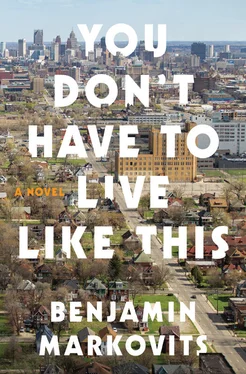Walter and Susie couldn’t stay at Bill’s place forever. Anyway, they felt isolated out there with the kid. So they moved into Robert’s old house, which was more or less intact, and eventually I moved in with them. It’s pretty intense, having a baby around. She’s present everywhere. You can hear her crying, her toys are on the floor, there are mush stains on the kitchen table. Sometimes I take the night shift, to give them a break. Shawntell sleeps on top of me in bed, and I lie there and try not to move. In the dark like that, my thoughts seem to expand — into the room, into the night. It’s strange to think she won’t remember any of this.
There are a lot of hands on deck; it’s a full house. “You’re going to have a happy childhood,” Susie says to her. “Everybody loves you.” But I don’t know how sustainable it is. Steve Zipp lived with us for a while, then went back to Ohio. The Wendelmans are here now. Bert’s son, though, has gone to live with his ex-wife in Grand Rapids. It’s not really a place for school-age kids. If a room is free, people hear about it, they knock on the door, and we usually let them in.
Franklin’s farm survived the riots, though Franklin himself moved to Boston, which is where he studied law. A lot of us pick over his land for things to eat, asparagus, corn, zucchini, beets, tomatoes, not to mention apples, pears, plums and blackberries, and pumpkins later in the year. I used to make a little cash by going through some of the burned-out houses and looking for things other people overlook. The electronic equipment was all gone, whatever could be melted down was gone, door handles, pipe work, etc. But sometimes I found old books in decent condition. Pictures or picture frames, toys can be worth money, flowerpots, even plants.
It’s a different place these days. Nobody has anything to show off. Guys help each other out, but there’s also a lot of petty theft — there are very thin boundaries.
My brother came and tried to take me away. He gave me two days of his time; I let him buy me dinner. When he couldn’t talk me into leaving, he flew home. As soon as he left (I watched his rented car drive off), the old confused feelings returned. I don’t know how anyone reconciles childhood and adulthood, it can’t be done. He said, “I’m going to leave you alone, but you have to call your mother once in a while.” I can’t call, our house doesn’t have a phone, and anyway, I don’t want to hear her voice. But sometimes I go to the public library and send her an email.
The fact is, I keep expecting my mother to turn up. I walk around like a runaway, looking over my shoulder. But either she can’t face me or Brad has talked her out of it.
I haven’t got a job, though I do some day labor, fruit picking, furniture removal, leafleting, yard work. As little as I can get away with. I still see people, Tony and Cris, for example. Walter and I joke that our fifteen-year reunion is coming up. Maybe we’ll go. I sold my car, I don’t know how I’d get there unless he drives me. Basically I’m treading water, but what you don’t expect from this kind of life is how many shifts of feeling it involves. My point of view is undergoing an alteration, and when your point of view changes you see things you couldn’t see before, different aspects of reality become available.
When Beatrice knocked on the door I didn’t recognize her. This was sometime in August, a hot gray day, in the nineties, sweaty and overcast. Robert’s house has a big front yard; in the summer it gets completely overgrown. The grass was seeding, mallow had run wild and flowered, bamboo was invading the lawn. My synapses had to adjust themselves to make sense of her face. I felt this almost physically. Her cheeks and her eyes, her forehead, realigned themselves until they fit again somewhere in my brain.
“I found you,” she said.
She was wearing a summer dress and sandals. I could see the beginning of her thighs, and her bony knees, and her ankles. She had the calves of a woman who jogs and a redhead’s pale tough skin. She looked successful and attractive and almost forty.
“I haven’t been hiding. Do you want to come in?”
“I want to get you out,” she said. “What are you doing to yourself? Is this some kind of penance?”
“Where are you staying?”
“Not with you.” This was a joke — she smiled a little too hard to prove it. “At Bill’s place, on the lake. He’s there, too. You’re welcome to join us, he says. I’ve rented a car.”
“For how long?”
“We’ll think of something. Is this some kind of penance?” she said again. “Has it worked?”
“I don’t know. How are you doing?”
“All right. There’s been a lot going on in my life, some of it good. I keep talking to you, Marny, in my head. I’m really very happy to see you. Come for the weekend. You can see Bill. And if you want afterwards you can come back here. I’ll drive you myself.”
“So I eat his food and sleep in his clean sheets. This isn’t what I need, I need my own private life.”
“Nobody will ask you anything you don’t want to talk about.”
“That’s not what I mean.” We stood like that for a minute, staring at each other. “I feel like I’m starting to get a grip on some important questions, but this may be just another stage of delusion.”
“Look,” she said, “I’m not going to leave you like this.”
“Like what?” I said and saw myself suddenly through her eyes. But I wouldn’t go with her; she eventually left in tears.
But that was months ago and it’s getting cold again. Everybody talks about the weather but nobody does anything about it. That always struck me as a very funny line. Maybe my brother is right, you need to build fences. You need a wife, you need kids, you need private school. Okay, so you worry about money. Worrying about money is what you pay for. It stops you from worrying about everything else.
I keep thinking about Beatrice. If she can make six figures by writing some novel about me, what should I get for writing this? I could start over. I could move to New York. Robert James is still there. Beatrice told me she was buying an apartment, a studio on the Upper West Side. So she’s living alone, I thought. With time on your hands you get all these ideas; you imagine things. But if I stay in Detroit I might run into Gloria, too. This is something else I think about — what to say. If I say the right thing, who knows.
A few of the guys kick a ball around at Butzel Park on Wednesday afternoons. Soccer is one of those recession games, it’s cheap, you only need a ball. Even in the cold, so long as it isn’t raining, they head out. A couple of hours before dusk, but sometimes they play into the dark, too. Most of us don’t have anything else to do. I haven’t played soccer since my mom was a soccer mom and used to drive Brad and me every Saturday morning to the Southside YMCA. But maybe once a month I go over to see if there’s a game. All kinds of memories come back to me, nothing is lost. Orange wedges and Capri Suns in the ice chest. Grass in your cleats. God knows what the parents are talking about. Their kids. You keep starting over. Somebody kicks the ball away from your feet. And for a few seconds you watch them passing it up the field. While your breath comes back, you just stand there, hands on hips. Fuck this, you think, but then you put your head down anyway, and when it’s probably too late to catch them, start running.
BENJAMIN MARKOVITSgrew up in Texas, London, Oxford and Berlin. He left an unpromising career as a professional basketball player to study the Romantics — an experience he wrote about in Playing Days , a fictional memoir forthcoming from Harper Perennial. He has written essays, stories, and reviews for, among other publications, The New York Times, Granta, The Guardian, London Review of Books and The Paris Review . The author of six novels, including a trilogy on the life of Lord Byron, he was a fellow of the Radcliffe Institute for Advanced Study at Harvard and won a Pushcart Prize in 2009. Granta selected him as one of the Best of Young British Novelists in 2013. Markovits lives in London and is married, with a daughter and a son.
Читать дальше












